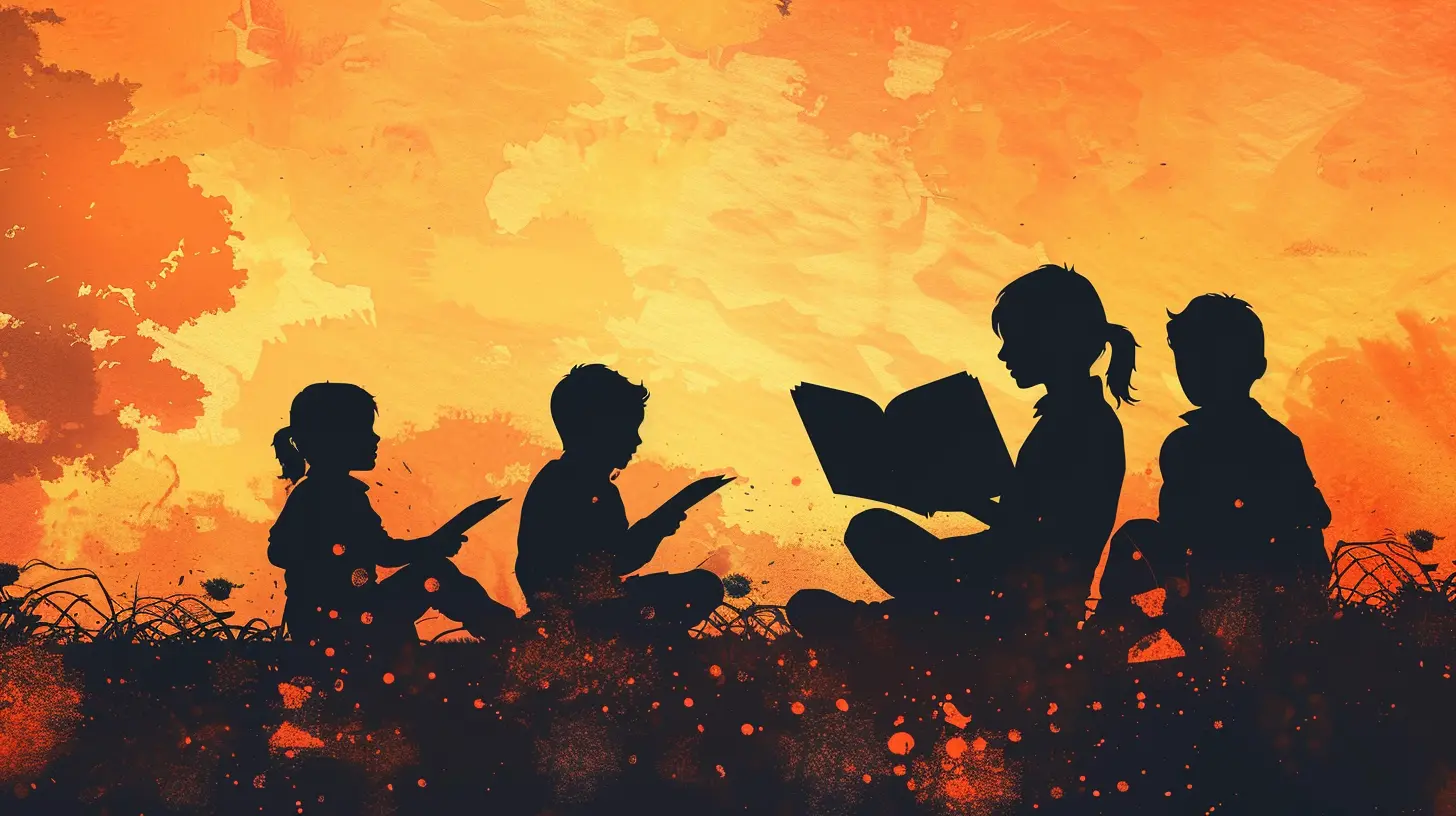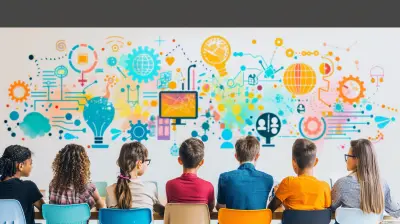The Power of Storytelling: Using Narratives in Lesson Planning
11 February 2025
Storytelling isn't just reserved for bedtime. In fact, it can be one of the most powerful tools in education. Think back to the lessons that stuck with you the most. Chances are, they weren't lists of facts or bullet-pointed notes. Instead, you probably remember a story—a narrative that brought the subject to life. Whether it's science, history, or even math, storytelling has the power to make lessons more engaging, memorable, and impactful.
But why does storytelling work so well in the classroom? And how can educators effectively incorporate narratives into their lesson planning? In this article, we'll explore the power of storytelling, its benefits in education, and practical strategies for weaving stories into your teaching methods.

What Makes Storytelling So Powerful?
Let's start by addressing the big question—why is storytelling such a game-changer, particularly in education? At its core, storytelling taps into something deeply human. We are wired to respond to stories. From the earliest cave paintings to the latest blockbuster movies, narratives have always been one of the most effective ways to communicate ideas, pass down knowledge, and connect with others.Stories Engage Our Emotions
One of the main reasons storytelling is so effective is because it engages our emotions. When we hear a story, we don’t just process information; we feel it. Emotions play a crucial role in memory retention. Think about your own experiences—when something makes you laugh, cry, or feel inspired, you’re more likely to remember it.Imagine teaching a history lesson about World War II. You could provide a list of dates, events, and facts, but what if instead, you shared a personal narrative of a soldier's life during the war? Suddenly, the lesson becomes more than just information. It’s a real, human experience—and that’s what sticks.
Stories Simplify Complex Concepts
We’ve all had those “aha!” moments when a difficult concept suddenly clicks, often because someone shared an analogy or metaphor. That’s the beauty of storytelling—it can take complex, abstract ideas and make them relatable and understandable.For example, explaining gravity can be challenging for young students. But telling a story about an apple falling from a tree, just like the one that inspired Isaac Newton, not only simplifies the concept but also makes it more interesting. Stories can act as bridges, connecting the known with the unknown.
Stories Make Content Memorable
Ever wonder why you still remember that fable you heard in kindergarten but can’t recall what you had for lunch last week? That’s because stories have a unique stickiness. They lodge themselves in our brains and are hard to forget. When we hear a narrative, we engage multiple parts of our brain, making the information more likely to be retained over time.In education, this means that lessons taught through storytelling are more likely to be remembered long after the class ends. And isn’t that the goal? We want our students to not just learn, but to retain and apply that knowledge in the real world.

The Benefits of Using Storytelling in Lesson Planning
Now that we’ve established why storytelling is so powerful, let’s dive into the specific benefits of using it in lesson planning.1. Enhances Student Engagement
One of the biggest challenges teachers face is keeping students engaged, especially in today’s world of constant distractions. Stories have a way of grabbing and holding attention. Unlike traditional lectures, which can become monotonous, a well-told story creates anticipation and curiosity—students want to know what happens next.In fact, a study by the University of Sussex found that students who were taught through storytelling showed higher levels of engagement and participation compared to those who were taught using conventional methods. By integrating stories into lesson plans, teachers can transform passive learners into active participants.
2. Improves Understanding and Comprehension
Storytelling isn’t just about entertainment—it’s also an effective way to explain and reinforce concepts. When students hear a story, they’re more likely to grasp the meaning behind the lesson. This is because stories often provide context, helping students see how the material applies to real-life situations.For instance, instead of explaining mathematical principles through abstract formulas, try telling a story about a character who needs to use math to solve a problem. This narrative approach can make challenging subjects more accessible and easier to understand.
3. Fosters Critical Thinking and Imagination
One of the most exciting aspects of storytelling is that it encourages students to think critically and use their imagination. When students are exposed to stories, they’re prompted to consider different perspectives, question assumptions, and think creatively about solutions.This is especially valuable for subjects like literature, social studies, and science, where the ability to analyze and interpret information is essential. By incorporating storytelling into lesson planning, teachers can create opportunities for students to engage in higher-order thinking.
4. Builds Empathy and Emotional Intelligence
Stories are powerful tools for building empathy. When students hear stories about people from different backgrounds, cultures, or experiences, they develop a deeper understanding and appreciation for others. This fosters emotional intelligence, a critical skill for navigating the complexities of the modern world.Incorporating narratives that highlight diverse perspectives can help students become more empathetic and open-minded. Whether it’s reading a novel about a character from another culture or listening to a guest speaker share their personal experiences, storytelling can be a catalyst for emotional growth.
5. Supports Memory Retention
Earlier, we touched on how storytelling engages emotions, making it easier for students to retain information. This is backed by research—studies have shown that students are more likely to remember lessons taught through storytelling compared to traditional methods.When information is framed within a narrative, it’s more likely to be stored in long-term memory. This is because stories provide a structure that makes it easier for the brain to organize and retrieve information.

Practical Strategies for Incorporating Storytelling into Lesson Planning
So, how can you as an educator start incorporating storytelling into your lesson plans? Here are some practical strategies to get you started:1. Create a Story Arc for Your Lessons
Just like any good story, your lessons should have a beginning, middle, and end. Start by introducing the topic in an engaging way—maybe with a hook or a question that gets students intrigued. Then, guide them through the “plot” of the lesson, presenting the key concepts or skills. Finally, wrap it up with a conclusion that ties everything together and leaves students with something to think about.For example, if you’re teaching a science lesson on ecosystems, you could start by telling the story of a specific animal and its environment. As the lesson progresses, introduce the challenges this animal faces, and by the end, discuss potential solutions or ways humans can help. This narrative structure makes the information more cohesive and engaging.
2. Use Real-World Examples and Case Studies
One of the easiest ways to incorporate storytelling into your lesson plans is to use real-world examples and case studies. These provide practical, relatable stories that help students understand how the subject matter applies to everyday life.For example, in a business class, you could tell the story of a successful entrepreneur and how they built their company from the ground up. Or in a history class, you could share the personal experiences of individuals who lived through significant historical events.
3. Encourage Students to Create Their Own Stories
Storytelling doesn’t always have to come from the teacher—get your students involved! Encourage them to create their own stories that relate to the lesson. This could be through creative writing, group projects, or presentations.For instance, after teaching a lesson on environmental science, you could ask students to write a short story about a character who is trying to solve an environmental problem in their community. This not only reinforces the material but also allows students to use their creativity and critical thinking skills.
4. Incorporate Multimedia Storytelling
In today’s digital age, storytelling can go beyond traditional verbal or written formats. Consider incorporating multimedia elements into your lessons—videos, podcasts, or even interactive storytelling tools like digital storyboards.For example, you could use a short film to introduce a concept, or ask students to create their own video presentations to explain what they’ve learned. Multimedia storytelling can appeal to different learning styles and make the lesson even more dynamic.
5. Use Analogies and Metaphors
Analogies and metaphors are powerful storytelling tools that can help simplify complex concepts. They allow students to make connections between new information and things they already understand.For instance, if you’re teaching a lesson about the circulatory system, you could compare it to a city’s transportation network, where the heart is like a central station, and the blood vessels are like roads and highways. This type of storytelling makes abstract concepts more concrete and easier to grasp.

Conclusion: The Lasting Impact of Storytelling in Education
Incorporating storytelling into lesson planning is more than just a teaching technique—it’s a way to create meaningful, lasting connections with students. By engaging their emotions, simplifying complex ideas, and fostering critical thinking, storytelling transforms the learning experience.So, the next time you’re planning a lesson, consider how you can weave a narrative into your teaching. Whether it’s through personal stories, real-world examples, or student-created narratives, storytelling has the power to make learning more engaging, memorable, and impactful.
all images in this post were generated using AI tools
Category:
Lesson PlansAuthor:

Eva Barker
Discussion
rate this article
19 comments
Amber Hughes
This article effectively highlights storytelling's transformative role in education, emphasizing its ability to engage students emotionally, enhance retention, and foster critical thinking through relatable narratives in lesson planning.
April 8, 2025 at 3:30 AM

Eva Barker
Thank you for your thoughtful comment! I'm glad you found the article's insights on storytelling's impact in education valuable.
Kristen Wilcox
Love this! Stories make learning so much fun!
March 17, 2025 at 8:16 PM

Eva Barker
Thank you! I'm glad you enjoyed it. Storytelling truly enhances the learning experience!
Lydia Alexander
This article beautifully highlights the transformative impact of storytelling in education. Incorporating narratives can truly engage students and enhance their learning experiences. A must-read for educators!
February 28, 2025 at 9:05 PM

Eva Barker
Thank you for your kind words! I'm glad you found the article meaningful and recognize the value of storytelling in education.
Reid Robinson
Transform lessons, ignite minds!
February 27, 2025 at 10:02 PM

Eva Barker
Thank you! Storytelling truly transforms lessons and engages students' minds in powerful ways.
Madalyn McAlister
Stories transform lessons into unforgettable experiences—empower your teaching through narratives!
February 27, 2025 at 11:35 AM

Eva Barker
Absolutely! Storytelling truly engages students and makes lessons memorable, enhancing their learning experience. Thank you for your insight!
Devin McCarty
This article brilliantly highlights how storytelling can transform lesson planning. By weaving narratives into education, teachers not only engage students but also enhance comprehension and retention, making learning a more memorable experience.
February 25, 2025 at 8:45 PM

Eva Barker
Thank you! I'm glad you found the article valuable. Storytelling truly does make a significant impact on learning experiences.
Zain McAdoo
This article effectively highlights the value of storytelling in education, emphasizing its ability to engage students and enhance comprehension. By integrating narratives into lesson planning, educators can create meaningful connections and foster creativity. A well-rounded approach to teaching that could truly enrich the learning experience. Great insights!
February 23, 2025 at 9:48 PM

Eva Barker
Thank you for your thoughtful feedback! I'm glad you found the insights on storytelling's role in education valuable. Engaging students through narratives can indeed transform learning experiences.
Hope Wade
This article beautifully highlights the transformative impact of storytelling in education! Integrating narratives into lesson planning not only engages students but also fosters deeper understanding and connection. It's a powerful way to make learning memorable and meaningful. Can't wait to implement these ideas in my classroom!
February 21, 2025 at 9:22 PM

Eva Barker
Thank you for your kind words! I'm thrilled to hear you're inspired to integrate storytelling in your classroom. Best of luck with your lessons!
Echo Wilson
Engaging stories enhance learning.
February 20, 2025 at 9:50 PM

Eva Barker
Absolutely! Engaging stories captivate students, making complex concepts more relatable and memorable, ultimately enhancing their learning experience.
Daniella Bishop
Who knew lesson planning could be as thrilling as a rollercoaster ride? By weaving narratives into our teaching, we transform dry facts into epic quests! Let’s trade our lesson plans for story scrolls and take our students on adventures that make even Shakespeare jealous! 🎢📚✨
February 19, 2025 at 10:00 PM

Eva Barker
Absolutely! Storytelling truly brings lessons to life, turning education into an exciting adventure. Let's inspire our students through epic narratives! 📖✨
Flora Russell
Storytelling in lesson plans? Absolutely! Who wouldn’t want to turn boring lectures into captivating adventures? Bring on the drama!
February 18, 2025 at 11:58 AM

Eva Barker
Absolutely! Storytelling transforms lessons, making them engaging and memorable. It brings learning to life!
Lena Hernandez
Incorporating storytelling into lesson planning can transform the learning experience. Narratives engage students emotionally, enhance retention, and make complex concepts relatable. By weaving stories into lessons, educators can create a more immersive and memorable educational environment, fostering a deeper understanding and connection to the material.
February 18, 2025 at 5:45 AM

Eva Barker
Absolutely! Storytelling captivates students and makes learning more relatable, ultimately enhancing engagement and retention. It's a powerful tool for creating meaningful connections with the material.
Elijah Lamb
Storytelling enhances lesson planning by fostering engagement and retention. By integrating narratives, educators can create meaningful connections to content, making lessons more relatable and memorable. This approach not only stimulates critical thinking but also encourages students to explore different perspectives, enriching the learning experience overall.
February 16, 2025 at 12:03 PM

Eva Barker
Thank you for your insightful comment! I completely agree—storytelling truly transforms lesson planning by making content more engaging and relatable, ultimately enhancing student learning and critical thinking.
Emery Phillips
Harnessing the power of storytelling in lesson planning transforms education into an engaging adventure. By weaving narratives into our teaching, we ignite curiosity, foster connection, and inspire critical thinking. Let’s embrace storytelling as a tool to empower our students and elevate their learning experiences!
February 14, 2025 at 7:41 PM

Eva Barker
Absolutely! Storytelling not only captivates students but also deepens their understanding and retention. It’s a powerful tool for creating meaningful learning experiences. Let's continue to explore its potential!
Cooper Navarro
The article effectively highlights the transformative role of storytelling in education. However, it could delve deeper into the challenges educators face in integrating narratives into diverse curricula, particularly addressing varying student backgrounds and learning styles to maximize engagement and comprehension.
February 14, 2025 at 2:03 PM

Eva Barker
Thank you for your insights! I appreciate your suggestion to explore the challenges educators face in integrating storytelling into diverse curricula. I will consider addressing varying student backgrounds and learning styles in future discussions.
Atlas McGivern
This article beautifully highlights how storytelling can enrich lesson plans and engage students more deeply. Thank you!
February 14, 2025 at 5:35 AM

Eva Barker
Thank you for your kind words! I'm glad you found the article helpful in enriching lesson plans through storytelling.
Ashira Gonzalez
Oh, absolutely! Because who wouldn’t want to turn a history lesson into a thrilling novel? Forget facts—let’s just weave tales of knights and dragons while teaching about the Fall of Rome! Storytelling magic, right?
February 13, 2025 at 9:32 PM

Eva Barker
Absolutely! Storytelling enriches lessons by making history engaging and memorable, blending facts with imagination.
Orion Williams
Embrace the transformative power of storytelling in education! By weaving narratives into lesson plans, we ignite creativity, foster connection, and inspire students to engage deeply with learning. Let’s craft stories that not only teach but also empower young minds to dream big!
February 13, 2025 at 5:28 AM

Eva Barker
Absolutely! Storytelling enriches education by making lessons more relatable and inspiring, allowing students to connect and dream bigger. Let's harness this powerful tool for deeper learning!
Oliver Miller
Harnessing the power of storytelling in lesson planning transforms education. Engaging narratives not only captivate students’ attention but also enhance retention and understanding. Educators must embrace this dynamic approach to foster deeper learning experiences.
February 12, 2025 at 5:48 AM

Eva Barker
Thank you for highlighting the importance of storytelling in education! Integrating narratives truly enhances engagement and retention, creating richer learning experiences for students.
MORE POSTS

Flipped Classroom: Empowering Students to Take Control of Their Learning

"Transforming School Culture with Emotional Intelligence

Blending Flipped Classrooms with Project-Based Learning

How to Set Realistic Goals for Homework Completion

How to Maintain Motivation While Preparing for Long-Term Standardized Tests

Extracurriculars: The Secret to Building a Well-Rounded Resume

Global Education and the Future of Work: How to Prepare

Using PBL to Teach Critical Environmental Issues

Building Global Education Systems that Promote Critical Thinking

How Trade Routes Influenced Cultural Exchange

How to Use Technology Effectively in a Flipped Classroom

How to Keep Your Child Motivated in Homeschooling